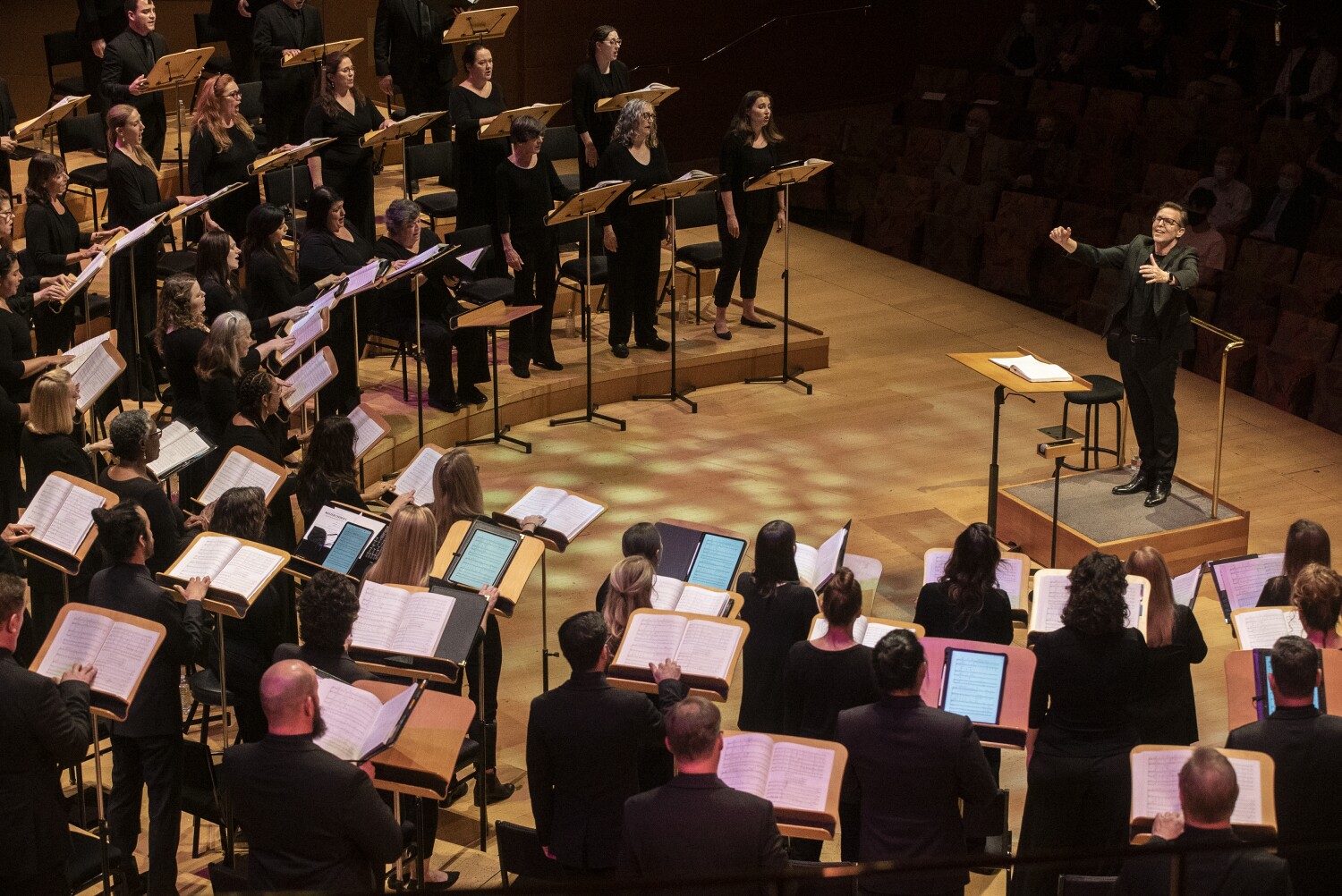
Sunday afternoon in Walt Disney Concert Hall, composer and pianist Nicholas Britell played a riff on Rachmaninoff as a surprise encore to his Los Angeles Philharmonic concert of film music. The crowd cheered with immediate delight, so recognizable is his theme to the HBO series “Succession.”
Three hours later, 80 members of the Los Angeles Master Chorale assembled on the stage to perform an “All-Night Vigil.” The vigil was that of the Russian Orthodox Church in solemn worship from dusk to dawn. The music, the audience, the ambience, could not have been more different. I wouldn’t be surprised if I were the only one at both concerts.
One thing was the same, however. Rachmaninoff. Make that two things. Not only is this incense-laden solemn “Vigil” by the same Russian composer who inspired Britell, but the work itself is also an extraordinary example of Rachmaninoff riffing. While remaining true to his source, he transformed a traditional Orthodox liturgy into a choral masterpiece of transporting rapture.
Rachmaninoff’s “Vigil” does not, of course, last all night. The slightly brisk, magnificently illuminating performance led by Grant Gershon needed only a little over an hour. But the composer used traditional melodies and invented a few of his own in the same style. He respected the practices of the Russian Orthodox Church, one of which is the disavowal of musical instruments, lest they distract from worship.
Even so, Rachmaninoff’s “Vigil” is no more an all-night church service than the music to “Succession” is a Rachmaninoff piano concerto. He instead limned the experience of a Russian Orthodox vigil into an artwork. This was the first regular concert by the Master Chorale since the COVID-19 pandemic began, and Gershon told the audience that the score, written in 1915 during World War I, came from a time of trial. Its 15 sections reflect the passage from dark night to a new day, which reflects what we, and choruses, have been living through.
Choruses have been hit particularly hard by the pandemic. Singing fulfills a communal need in nearly all societies, as the Italians reminded us by standing on their balconies and singing in informal togetherness to keep their spirits up during lockdown. Singing and spirituality are, furthermore, ever one. Throughout history, we have communicated through song to whatever deity happens to be on hand.
Instrumental ensembles could still somewhat function during the pandemic, with players masked or separated by plastic barriers, but for much too long, a novel coronavirus made convening choruses an unthinkable act of spreading potentially deadly aerosols. As the L.A. Phil returned to the Hollywood Bowl in the summer, the poor Master Chorale — always a fixture at these concerts — couldn’t be employed for safety reasons.
Determined to make the Master Chorale’s concert reentry meaningful, Gershon focused exclusively on the incredible potency of unvarnished massed singing. Basses dropping down to their lowest tones and sopranos reaching for elevated highs, as well as all the nuances in between, became a show of our humanness.
In this, Rachmaninoff makes worship luscious. He applies harmonic lushness to exotic-sounding old chants. He eschews counterpoint — there are no “Messiah” revelries of intersecting parts. It’s all mostly homophonic, with every singer on the same page, but yet an individual amassing into a whole.
Dark night in this “Vigil” isn’t half bad. Welcoming chants are repeated several times with blessings galore, increasing in enthusiasm. The allure of alleluias is inescapable. Erase from your imagination those gloomy czar-laden cathedrals. Already by the fourth section, Rachmaninoff exults in “Gladsome Light.” By the end, blessing becomes second nature. In a final hymn of thanksgiving, salvation is promised and musically delivered.
This, though, can be dull stuff, one lugubrious section after another, as the “Vigil” comes across on many an uninspired recording. None of it sounds faintly like Rachmaninoff, who became so popular that he grew to hate the showy C-Sharp Minor Prelude for which he was known. Dig a little and you can, although not easily, recognize his harmonic handiwork in his choral writing. But you need to hear it live and in a great acoustic space to fully sense how Rachmaninoff’s wizardry transformed reverberating voices into orchestral sounds.
That is how the Master Chorale made it all seem when Gershon conducted a beautiful performance of “Vigil” eight years ago to celebrate the chorus’ 50th anniversary. This time, he transcended beauty and fashioned the kind of transparency that made it possible to pick out individual voices. After so many months apart, the singers approached everything as new and fresh and different from what had been.
When breathy, the chorus reminded me of the gong that ended Rachmaninoff’s Symphonic Dances (which also quote “Vigil”) in Susanna Mälkki’s performance of the composer’s last work at her L.A. Phil concert three weeks ago at Disney Hall. Mälkki made sure that gong had the gusto of avant-garde percussion.
That is where Britell comes in. He took the overplayed prelude and created something modern, a kind of succession of the prelude. It is thus in the spirit of Rachmaninoff’s own succession of a Russian Orthodox service. On Sunday and on the heels of Britell, the “Vigil” served not only as a beacon of Rachmaninoff’s time but also of ours.
Welcome back, Master Chorale. You’ve been missed.
For all the latest Entertainment News Click Here
For the latest news and updates, follow us on Google News.
